Chinas Battle for KoreaTWENTIETH-CENTURY BATTLES
Edited by Spencer C. Tucker
Balkan Breakthrough
Richard C. Hall
The Battle for Manchuria and the Fate of China: Siping, 1946
Harold Tanner
The Battle for Western Europe, Fall 1944: An Operational Assessment
John A. Adams
The Battle of An Loc
James H. Willbanks
The Battle of Heligoland Bight
Eric W. Osborne
The Battle of Leyte Gulf: The Last Fleet Action
H. P. Willmott
The Battle of the Otranto Straits: Controlling the Gateway to the Adriatic in World War I
Paul G. Halpern
Battle of Surigao Strait
Anthony P. Tully
The Brusilov Offensive
Timothy C. Dowling
D-Day in the Pacific: The Battle of Saipan
Harold J. Goldberg
The Dieppe Raid: The Story of the Disastrous 1942 Expedition
Robin Neillands
The Imjin and Kapyong Battles: Korea, 1951
Paul MacKenzie
In Passage Perilous: Malta and the Convoy Battles of June 1942
Vincent P. OHara
Midway Inquest: Why the Japanese Lost the Battle of Midway
Dallas Woodbury Isom
Operation Albion: The German Conquest of the Baltic Islands
Michael B. Barrett
Prelude to Blitzkrieg: The 1916 Austro-German Campaign in Romania
Michael B. Barrett
The Second Battle of the Marne
Michael S. Neiberg
Chinas Battle for Korea
The 1951 Spring Offensive
Xiaobing Li
INDIANA UNIVERSITY PRESS Bloomington & Indianapolis
This book is a publication of
INDIANA UNIVERSITY PRESS
Office of Scholarly Publishing
Herman B Wells Library 350
1320 East 10th Street
Bloomington, Indiana 47405 USA
iupress.indiana.edu
Telephone orders 800-842-6796
Fax orders 812-855-7931
2014 by Xiaobing Li
All rights reserved
No part of this book may be reproduced or utilized in any form or by any means, electronic or mechanical, including photocopying and recording, or by any information storage and retrieval system, without permission in writing from the publisher. The Association of American University Presses Resolution on Permissions constitutes the only exception to this prohibition.

The paper used in this publication meets the minimum requirements of the American National Standard for Information SciencesPermanence of Paper for Printed Library Materials, ANSI Z39.481992.
Manufactured in the United States of America
Library of Congress
Cataloging-in-Publication Data
Li, Xiaobing, [date]
Chinas battle for Korea : the 1951 spring offensive / Xiaobing Li.
pages cm
Includes bibliographical references and index.
ISBN 978-0-253-01157-2 (hardback) ISBN 978-0-253-01163-3 (e-book) 1. Korean War, 1950-1953Participation, Chinese. 2. Korean War, 1950-1953Campaigns. I. Title.
DS919.5.L536 2014
951.9042351dc23
2013037078
1 2 3 4 5 19 18 17 16 15 14
FOR MY PARENTS,
Li Weiying and Zhang Xiaoyi
Contents
Maps and Charts
MAPS
CHARTS
Acknowledgments
MANY PEOPLE AT THE UNIVERSITY OF CENTRAL OKLAHOMA (UCO), where I have been teaching since 1993, have contributed to this book and deserve recognition. First, I would like to thank Provost John F. Barthell, Vice Provost Patricia A. LaGrow, Dean of the College of Liberal Arts Gary Steward, and Dean of the Jackson College of Graduate Studies Richard Bernard. They have been very supportive of the project over the past twelve years. The faculty merit-credit program sponsored by the Office of Academic Affairs, a research grant from the Office of Research and Grants, and a research grant from the College of Liberal Arts at UCO provided funding for my research and student assistants.
I wish to thank my Chinese colleagues and collaborators at the China Academy of Military Science, China Academy of Social Sciences, Military Archives of the Peoples Liberation Army (PLA), Chinese National Defense University, Peking University, East China Normal University, China Society for Strategy and Management, China Foundation for International and Strategic Studies, Logistics College of the PLA, Nanjing Political Academy of the PLA, and provincial academies of social sciences and history museums in Heilongjiang, Jilin, and Liaoning. They made the many arrangements necessary for me to interview PLA officers and retired generals in 19992011. I am grateful to Chen Zhiya, Li Danhui, Niu Jun, Shen Zhihua, Wang Baocun, Wang Po, Yang Kuisong, Yang Shaojun, Zhang Baijia, Zhang Pengfei, and Zhang Tiejiang for their help and advice on my research in China. Thanks also to the staff of the China Reunification Alliance and the Veterans Affairs Commission of the Republic of China (ROC), in Taipei, Taiwan. They provided financial assistance and arranged many interviews for me with former prisoners of war during my several trips to Taiwan in 19962010.
Special thanks to Stanley J. Adamiak and Beverly Rorem, who proofread all of the chapters. Chen Jian, David M. Finkelstein, Walter Byung Jung, Steven I. Levine, Allan R. Millett, Richard Peters, David Shambaugh, Harold M. Tanner, Yafeng Xia, Shuguang Zhang, and Xiaoming Zhang made important comments on earlier versions of some chapters that were presented as conference papers. Pat Hoig proofread some of the chapters. Gregory Whitaker re-drew all the maps. Annamaria Martucci provided secretarial assistance. Several graduate students at UCO traveled with me to meet veterans, transcribed the interviews, and read parts of the manuscript. They are Colonel Ming-Hsien Chuang (ROC National Defense University, Chinese Nationalist Army, ret.), Major Phred Evans (U.S. Army, ret.), Technical Sergeant Charles D. Heaverin (U.S. Air Force, ret.), Captain Alex Zheng Xing (PLA, ret.), Haodu Li, Michael Molina, Senior Airman Oliver Pettry (U.S. Air Force), First Lieutenant Jimmy Xiangyao Xu (PLA, ret.), and Kevin Yang.
I also wish to thank Spencer C. Tucker, editor of the Twentieth-Century Battles book series for Indiana University Press, who offered many valuable suggestions and criticisms in the past four years. The presss anonymous readers also provided important suggestions. At the press, Robert J. Sloan, editorial director, patiently guided the production of the book. Any remaining errors of facts, language usage, and interpretation are my own.
During the research and writing over the past twelve years, my parents encouraged my interest in the Korean War and helped me with the contacts, interviews, and translations in China. I dedicate this book to them. My wife, Tran, and our two children, Kevin and Christina, got used to my working weekends and holidays and shared with me the burden of overseas travel. Their understanding and love made this book possible.
Introduction: Chinas War against America
CHEN FULIANG (19312008) HAD DIED. I GOT THIS GRIEVOUS news when his wife called and canceled our interview. You dont need to come, she said and hung up the phone. I made the trip to the village anyway, leaving the Australian film director and his Korean War documentary crew in Nanjing, the capital of southeastern Jiangsu (Kiangsu) Province.
Simple and brief, Chens funeral was held in Shangzhuang, a small village on Tongkeng Mountain, in Lishui County, Jiangsu. Chen had been born in that same village; he was a peasant, a family man, and a Korean War veteran. Not many villagers attended his funeral on that rainy spring day. No one mentioned his service in the Peoples Liberation Army (Chinas combined army, navy, air force, and strategic missile force commonly known as the PLA).

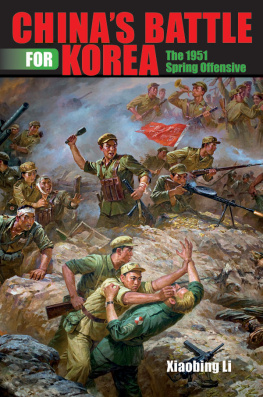
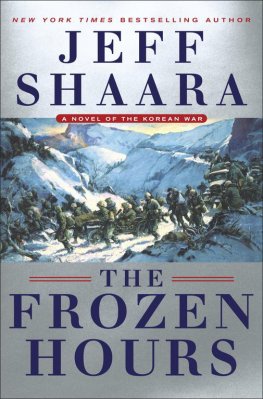
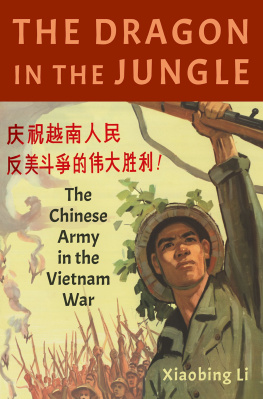

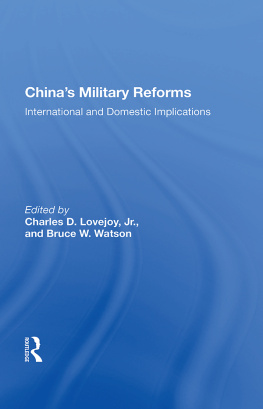
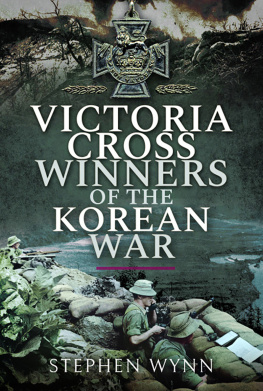
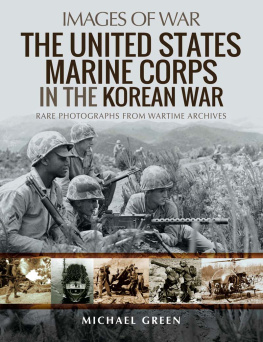
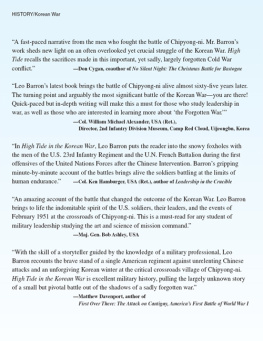
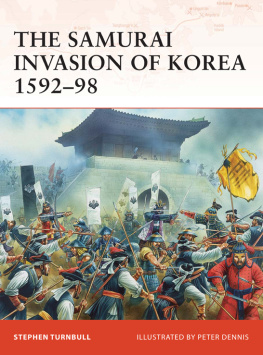
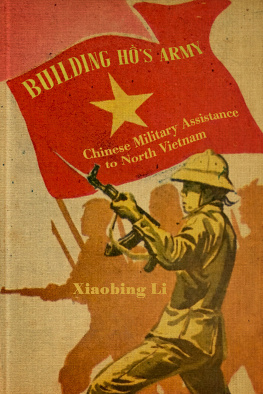
 The paper used in this publication meets the minimum requirements of the American National Standard for Information SciencesPermanence of Paper for Printed Library Materials, ANSI Z39.481992.
The paper used in this publication meets the minimum requirements of the American National Standard for Information SciencesPermanence of Paper for Printed Library Materials, ANSI Z39.481992.